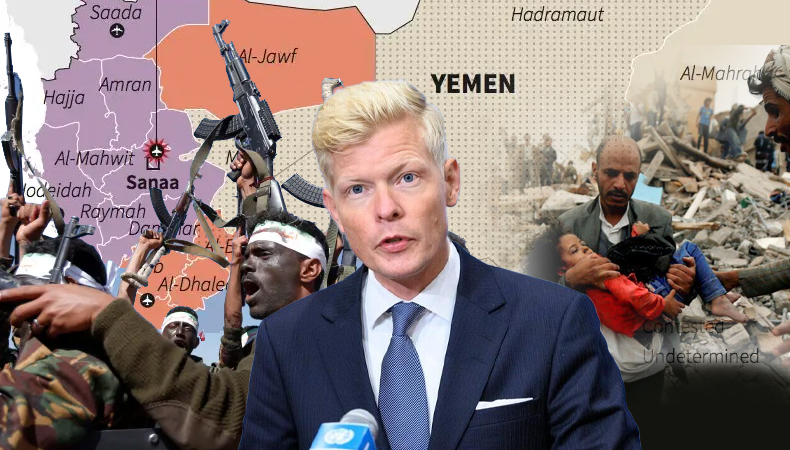Yemen conflict won’t settle through violence: UN

According to the UN special envoy for Yemen, on Tuesday, any attempt to resolve the crisis in the nation through violence is “unhelpful,” and the only way to reach a lasting agreement is through direct discussions.
Hans Grundberg was remarking on the Houthi militia’s numerous drone strikes against Yemen government ports over the previous two months, one of which struck a Greek oil ship close to the Al-Dubba oil terminal in the Hadramawt governorate.
As a message to the government not to exploit the terminal for oil exports, the Houthis justified the strike. The attacks were denounced by the UN Security Council.
Later, the Rudum oil facility and the southern Qena port in the Shabwah governorate were the targets of similar drone assaults.
The UNSC continued to denounce this and demanded that the Houthis reinstate the cease-fire they had broken.
The Houthi escalation was referred to by Grundberg, who had previously denounced these assaults, as “part of the larger aspects of the conflict.”
“My argument here is that this problem ought to be resolved through diplomacy,” he said. And because of this, any attempt to resolve the disagreement by violence, regardless of how violence is expressed, is ineffective, especially in light of the fact that the conflict has persisted for at least seven to eight years.
“More violence won’t result in a durable resolution. That can only be accomplished through discussions, which is what we’re promoting and hoping to accomplish at some point.”
Read | US Navy seizes Iranian missile fuel bound to Yemen
Grundberg made his remarks after briefing member states on the most recent events in the war-torn nation at a UNSC meeting on Yemen.
He cautioned the council members that recent Houthi attacks, which cut off the Yemeni government’s primary source of income from oil exports, “had enormous economic ramifications.”
International humanitarian law forbids attacks on oil infrastructure and threats against oil firms because they jeopardize the welfare of the whole Yemeni population and run the risk of igniting a chain reaction of military and economic escalation.
Grundberg also emphasized how precarious the situation is still, citing what he called “a disturbing rise” in incidents in Marib and Taiz that include civilian casualties.
In addition, he urged all sides to “show greatest caution during this crucial period” and to “urgently find an agreement to renew the truce.”
Grundberg cautioned that further deterioration of the economic and humanitarian circumstances hang in the balance despite the fact that the violent outbursts “fortunately” have not developed into full-fledged war.
The UN has stepped up efforts to try to resurrect the two-month truce since it ended on October 2 and pushed for a complete settlement.
In the past two months, Grundberg has made two trips to Riyadh, where he spoke with Yemen and Saudi authorities. He has also made trips to Oman, where he talked with senior Omani officials and Mohammed Abdulsalam, the leading Houthi negotiator. However, no significant developments have come from these discussions.
Prior to the cease-expiration, fire’s Grundberg had put out a proposal for its prolongation and enlargement that included paying civil officials’ salaries and pensions.
Agreement on the arrangement was prevented by the Houthis’ demand that their military and security services be paid alongside state officials’ salaries.
Over the past few weeks, there have also been rumours of direct negotiations between the Houthis and Saudi Arabia, some of which have been arranged by Oman, as Grundberg carried on with his shuttle diplomacy.
A Saudi group traveled to Sanaa last month, and a delegation from the Houthis visited the Saudi city of Abha.
The delegates’ visits to prisoners of war, according to the Arab Coalition, were part of a confidence-boosting strategy intended to prolong the cease-fire.




